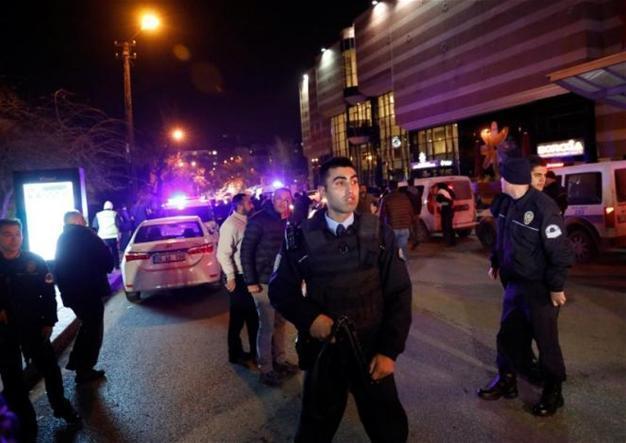NEWS ANALYSIS: Russian ambassador’s murder might have consequences
Murat Yetkin

Turkish police secure the area near an art gallery where the Russian Ambassador to Turkey Andrei Karlov was shot, in Ankara. Reuters photo
I knew Andrey Karlov in person. The Russian ambassador to Ankara was from the old school, a Cold War warrior, who even served in North Korea. In the worst times of the Turkish-Russian crisis after Turkey downed a Russian plane on the Syrian border, Karlov did not lose his calm.
His last words before being shot by Turkish police officer Mevlüt Mert Altıntaş in the back were “it is always easy to destroy, but difficult to construct” at the opening of a Turkish-Russian photograph exhibition in Ankara late on Dec. 19.
Before firing his pistol, the attacker shouted slogans at him about children being killed in Aleppo because of Russia in Turkish and broken Arabic (which sounded similar to al-Nusra rhetoric, but not exactly so according to some security analysts) and said, “Neither you nor me are going to leave here alive.”
The police immediately sealed the building of the Arts and Culture Center belonging to the municipality of Ankara’s Çankaya district and evacuated the civilians. This is supposed to be one of the places with the maximum security in Turkey. In a 50-meter radius, there are the U.S., German and Austrian embassies, the Ankara Chamber of Industry, the Banking Regulation and Supervision Agency (BDDK), the Chief Prosecutor’s Office of the Court of Appeals and the Russian Trade Office. It is near Atatürk Boulevard, where the prime minister passes every day, sometimes more than once, to go to his office.
But if you carry a police badge, like this young police officer, you do not have any difficulty in entering security areas. There are claims that he might be a member of the secret network of Fethullah Gülen, the U.S.-resident Islamist preacher who is accused of masterminding the July 15 coup attempt, but then how on earth did he save himself from the mass dismissals in the wake of it?
When the attacker shot and killed the Russian ambassador, Turkish Foreign Minister Mevlüt Çavuşoğlu was aboard a plane on his way to Moscow to attend a meeting between the foreign ministers of Russia, Turkey and Iran on the situation in Syria. The attack was carried out right before it, but Russia said the meeting would be held as planned.
Turkish President Tayyip Erdoğan and Russian President Vladimir Putin made public statements almost at the same time and denounced the attack as one targeting the improvement of relations between the two countries.
Erdoğan also said he accepted a suggestion by Putin to have a joint security team investigate the murder.
In his statement, Putin said Russia wanted to know who was behind the attack.
If the attacker had been captured unharmed, or at least wounded, it would have been much easier to get information from him during the interrogation and prosecution.
But in a small building, against a person carrying only a pistol, the police did not choose methods like using tear gas, or shooting at his legs, or simply talking him into surrendering, but “neutralized him during a clash,” as Interior Minister Süleyman Soylu put it in a statement nearly three hours after the killing – something which must be investigated together with the investigation of the murder.
Karlov’s murder has not only taken the dimension of terrorism up a level in Turkey but is likely to have consequences in Turkey’s international relations and in the political balances in the Middle East, especially if the perpetrators of the murder will not be identified – the sooner the better – and accepted by the Russians.
Turkey failed to protect the life of a diplomat who was under its responsibility. Karlov was the first ambassador assassinated in Turkey. That is a shame for Turkey. It is the responsibility of the government to remove this burden from the shoulders of Turkey and the Turkish people.
